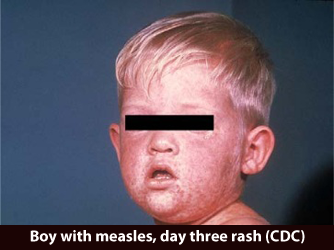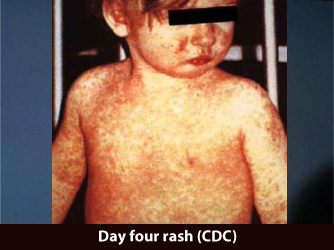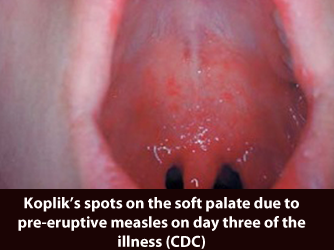Measles
Measles is very contagious and spreads through the air when an infected person coughs or sneezes. Measles virus can stay in the air or on surfaces for up to two hours after an infected person has left the room.
Measles symptoms appear 7 to 14 days after contact with the virus, typically including high fever, cough, runny nose, and watery eyes. Then, a rash of tiny, red spots breaks out. It starts at the head and spreads to the rest of the body.
The MMR (measles, mumps, rubella) vaccine can prevent measles and rubella. The vaccine is safe and effective. The Centers for Disease Control and Prevention (CDC) recommends children receive their first dose of MMR vaccine between 12-15 months of age and a second dose between 4-6 years old. More than 95% of the people who receive a single dose of MMR will develop immunity to all three viruses. A second dose boosts immunity, typically enhancing protection to 98%.
People with symptoms of measles should contact their healthcare provider immediately. DO NOT go to the doctor’s office, the hospital, or a public health clinic without first calling to let them know about your symptoms. Healthcare providers who suspect measles in a patient should notify public health immediately.
Measles
Measles, also called Rubeola, is a highly contagious viral disease. The disease is no longer common in the United States, however it is widespread in many parts of the world including Europe, Africa, and Asia.
Measles begins with a fever that lasts for a couple of days, followed by a cough, runny nose, and conjunctivitis (pink eye). These symptoms are followed by a maculopapular rash that begins at the hairline, moves to the face and upper neck and then down the body. Infected people are usually contagious from about 4 days before their rash starts to 4 days afterwards.
-
Measles Info graph
- Measles Basics
- Measles Information for Healthcare Professionals
- Measles Information for Schools and Childcare
- Measles Statistics
-
What if I am Exposed to Measles?
What if I am Exposed to Measles? (Spanish)
Measles (Rubeola) Basics
General information about measles including disease description, complications, treatment and prevention.
- About Measles
General information from the CDC about measles, including transmission, symptoms, diagnosis and treatment. Also includes photos and kid-friendly fact sheet.
Reporting
- Reporting Measles
All suspect cases of measles should be reported to the Georgia Department of Public Health immediately. Find out more about what needs to be reported, who needs to report diseases, which forms to use and where to find out more about the disease.
Vaccine Information
The best way to prevent measles is for all children to be fully vaccinated on time. There are two combination vaccines used to prevent measles: measles-mumps-rubella (MMR) vaccine and measles-mumps-rubella-varicella (MMRV) vaccine.
- Measles, Mumps, Rubella (MMR) Vaccine Information Statement (VIS)
CDC Vaccine Information Statement: includes a description of the disease, who should get the vaccine and when, who should not be vaccinated, and potential side effects. - MMR: What You Need to Know
Experts from the CDC answer challenging questions about vaccines and their administration.
Measles Information for Health Professionals
Clinical Features and Epidemiology
- Manual for the Surveillance of Vaccine-Preventable Disease
- Measles chapter in the CDC’s Manual for the Surveillance of Vaccine-Preventable Diseases.



Measles Laboratory Testing
-
Measles Specimen Collection and Submission Guidelines
Suspect cases of measles infection can be confirmed by serologic testing, culture, and/or polymerase chain reaction (PCR). Maximum sensitivity and specificity are achieved when serologic tests, culture and PCR are performed.
Post-exposure Prophylaxis
- Post-exposure Prophylaxis for Exposed Persons
Algorithm to determine appropriate post-exposure prophylaxis for exposed individuals.
Reporting
- Reporting Measles
All suspect cases of measles should be reported to the Georgia Department of Public Health immediately. Find out more about what needs to be reported, who needs to report diseases, which forms to use and where to find out more about the disease. - Measles Case Report Form
Vaccine Information
The best way to prevent measles is for all children to be fully vaccinated on time. There are two combination vaccines used to prevent measles: measles-mumps-rubella (MMR) vaccine and measles-mumps-rubella-varicella (MMRV) vaccine.
- Measles, Mumps, Rubella (MMR) Vaccine Information Statement (VIS)
CDC Vaccine Information Statement: includes a description of the disease, who should get the vaccine and when, who should not be vaccinated, and potential side effects. - MMR Vaccines: What You Need to Know
Experts from the CDC answer challenging questions about vaccines and their administration.
Measles Information for Schools and Child Care
Information for reporting and handling measles case-patients and outbreaks for school health personnel and child care settings.
Reporting
- Reporting Measles
All suspect cases of measles should be reported to the Georgia Department of Public Health immediately. Find out more about what needs to be reported, who needs to report diseases, which forms to use and where to find out more about the disease. - Measles Case Report Form
Measles Statistics
Measles is currently a rare disease in Georgia and in the U.S.; however, measles continues to occur commonly in other parts of the world. Measles can be brought into Georgia by unvaccinated persons who travel to or from countries where measles is common, and who are infectious with measles after arriving in Georgia. Measles can spread easily to unvaccinated persons; therefore, maintaining high immunization rates is essential to preventing measles.
| Year | Cases (n) |
| 2014 | 0 |
| 2015 | 1 |
| 2016 | 0 |
| 2017 | 0 |
| 2018 | 0 |
| 2019 | 18 |
| 2020 | 1 |
| 2021 | 0 |
| 2022 | 0 |
| 2023 | 0 |
| 2024 | 6 |
| 2025 | 10 |
| 2026 | 1* |
*as of January 24, 2026
Page last updated 1/24/2026